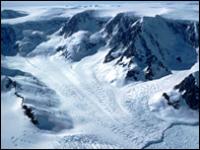







|
News and Information
Antarctic glaciers show retreat
| April 21, 2005 |

By Jonathan Amos
BBC News science reporter
Overall, retreating glaciers have lost an average of 600m in 50 years
The glaciers of the Antarctic Peninsula are in rapid retreat.
A detailed study reported in Science magazine shows nearly 90% of the ice bodies streaming down from the mountains to the ocean are losing mass.
But the authors - a joint team from the British-Antarctic and US-Geological Surveys - say the big melt could have a number of complex causes.
Although higher air temperatures are a factor, they say, the full picture may go beyond just simple global warming.
This study demonstrates the enormous importance of gathering long-term data
Dr Andrew Sugden, Science magazine,
"The overall picture is of glaciers retreating in a pattern that suggests the most important factor is atmospheric warming; we can connect the retreat with the observed warming recorded at climate stations along the peninsula," explained Dr David Vaughan, from the British Antarctic Survey (Bas).
"But it's not a perfect fit; there seem to be other factors involved as well - possibly to do with changing ocean currents and temperatures," he told BBC News.
See how the Sheldon Glacier has changed over time
The study covers 244 marine glaciers found largely on the western side of the peninsula.
They are all relatively small, independent streams of ice that fall from an altitude of about 2,000m down to sea level. Their fronts either ground and calve icebergs into the ocean, or push out into the water as a floating "tongue".
The team used more than 2,000 aerial photographs dating from 1940, and over 100 satellite images from the 1960s onwards, to assess the change in position of glacier fronts over time.
Bas scientist Alison Cook, who led the research, said: "This is the first comprehensive study of marine glaciers on the Antarctic Peninsula,"
'Shrinking rapidly'
"We found that 87% of the 244 glaciers have shown retreat since the earliest records, which on average were 1953.
"This is a reverse of the pattern 50 years ago - then most glaciers were actually growing. Now the majority are shrinking and rapidly."
The melting trend began in the north of the peninsula and has steadily worked southwards. The last five years have seen the greatest losses in mass, with an average shrinkage of 50m per year.
Some individual losses, however, have been very dramatic. Sjogren Glacier, at the northern end of the peninsula, has moved back 13km since 1993, more than any other glacier in the study.
Some of the glaciers rest on rock and calve icebergs at the water's edge
Sjogren Glacier had flowed into the Prince Gustav Ice Shelf and when the ice shelf broke up in 1993, the glacier retreated rapidly.
Thirty-two glaciers buck the trend, but their advance - an average of 300m per glacier over the study period - is less than the shrinkage of the main group and their distribution fits no clear pattern.
Their growth, the team believes, illustrates the point that glacier length is being influenced by a complex interplay of forces.
The topography, underlying geology, wind and precipitation patterns, the amount of sea ice in front of the glaciers - all could have a role, the researchers say, and at the moment there is little data on any of them.
Computer models
This information will be crucial to the improvement of computer models that are used to predict future climate change in the region, with all the implications that has for further ice melt and possible sea level rises.
These systems have struggled to reproduce the conditions on the Antarctic Peninsula where average air temperatures have risen by around 2C in just 50 years - one of the fastest warming rates on Earth.
Dr Vaughan said: "Whether we can expect that warming trend to extend to the rest of the Antarctic is extremely uncertain.
"The Antarctic is really too small an area to be resolved in the models and that's the level we have to get down to if we want to predict what is going to happen in a particular place."
Dr Andrew Sugden, the international managing editor of Science magazine, commented: "This study demonstrates the enormous importance of gathering long-term data.
"It is only in the accumulation of this data that we are going to be able to understand and predict what might happen to our planet in the future." |
Source: www.bbc.com |
| http://news.bbc.co.uk/2/hi/science/nature/4471135.stm |
|
| Support Caprivi Freedom |
Fill out the form below to become a member of this site and receive our regular newsletter.
|

|

